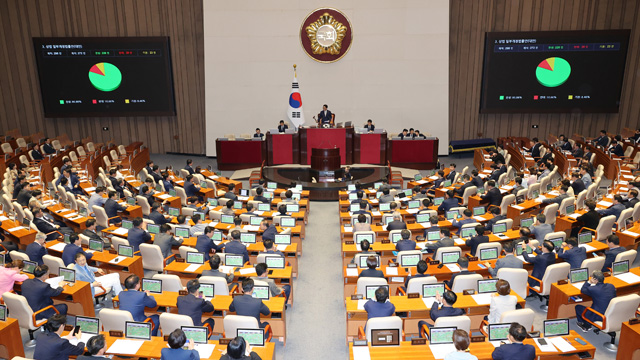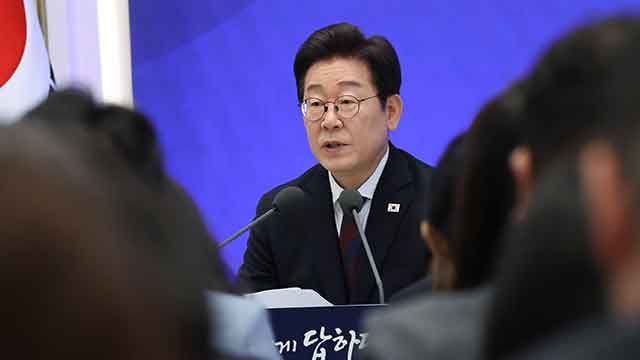CLIMATE CHANGE AFFECTS SEASONAL DIVISIONS
입력 2021.04.29 (15:14)
수정 2021.04.29 (16:45)
읽어주기 기능은 크롬기반의
브라우저에서만 사용하실 수 있습니다.
[Anchor Lead]
The 24 solar terms of the traditional lunar calendar are gradually becoming obsolete due to rapid climate change. Temperatures in Seoul have risen nearly 2 degrees Celsius in the past century, making the seasonal divisions lose their original meaning.
[Pkg]
Athletes skate on the frozen Hangang River ahead of a competition. People are gathered at the center of the frozen river taking in the winter view. This is a scene from the 1950s.
[Soundbite] (Daehan News(1956)) : "This year we're having a cold spell a week earlier than in previous years. The Hangang River froze earlier, and young people are having fun skating on it."
But nowadays it's hard to witness the Hangang River frozen so deep. Even during cold spells, it rarely freezes completely. One of the reasons is the rapid rise in temperatures. Temperatures in six cities in Korea have risen 1.6 degrees on average in the past century. In large cities such as Daegu and Seoul the increase was twice the level recorded in smaller cities. Spring and winter temperatures have surged particularly noticeably. A century ago, winter temperatures during Daehan, or the Great Cold, fell to 2.1 degrees below zero. But nowadays they are 3 degrees higher. In fact, Daehan is even warmer than Ipchun or Usu 100 years ago.
[Soundbite] Kim Jung-shik(Korea Meteorological Administration): "Spring and winter seasonal divisions have higher temperatures these days. A noticeable increase in the lowest temperatures indicates global warming."
The length of each season has also changed. A century ago, the longest season was winter. Now the year's coldest season is22 days shorter and only lasts 87 days. Summer is 20 days longer, and is the longest season of the year. There are fewer cold spells but more tropical nights, heat waves and torrential rains. Climate experts are warning that if nothing is done urgently to prevent global warming, half of the year will become summer months by the end of this century.
The 24 solar terms of the traditional lunar calendar are gradually becoming obsolete due to rapid climate change. Temperatures in Seoul have risen nearly 2 degrees Celsius in the past century, making the seasonal divisions lose their original meaning.
[Pkg]
Athletes skate on the frozen Hangang River ahead of a competition. People are gathered at the center of the frozen river taking in the winter view. This is a scene from the 1950s.
[Soundbite] (Daehan News(1956)) : "This year we're having a cold spell a week earlier than in previous years. The Hangang River froze earlier, and young people are having fun skating on it."
But nowadays it's hard to witness the Hangang River frozen so deep. Even during cold spells, it rarely freezes completely. One of the reasons is the rapid rise in temperatures. Temperatures in six cities in Korea have risen 1.6 degrees on average in the past century. In large cities such as Daegu and Seoul the increase was twice the level recorded in smaller cities. Spring and winter temperatures have surged particularly noticeably. A century ago, winter temperatures during Daehan, or the Great Cold, fell to 2.1 degrees below zero. But nowadays they are 3 degrees higher. In fact, Daehan is even warmer than Ipchun or Usu 100 years ago.
[Soundbite] Kim Jung-shik(Korea Meteorological Administration): "Spring and winter seasonal divisions have higher temperatures these days. A noticeable increase in the lowest temperatures indicates global warming."
The length of each season has also changed. A century ago, the longest season was winter. Now the year's coldest season is22 days shorter and only lasts 87 days. Summer is 20 days longer, and is the longest season of the year. There are fewer cold spells but more tropical nights, heat waves and torrential rains. Climate experts are warning that if nothing is done urgently to prevent global warming, half of the year will become summer months by the end of this century.
■ 제보하기
▷ 카카오톡 : 'KBS제보' 검색, 채널 추가
▷ 전화 : 02-781-1234, 4444
▷ 이메일 : kbs1234@kbs.co.kr
▷ 유튜브, 네이버, 카카오에서도 KBS뉴스를 구독해주세요!
- CLIMATE CHANGE AFFECTS SEASONAL DIVISIONS
-
- 입력 2021-04-29 15:14:09
- 수정2021-04-29 16:45:24

[Anchor Lead]
The 24 solar terms of the traditional lunar calendar are gradually becoming obsolete due to rapid climate change. Temperatures in Seoul have risen nearly 2 degrees Celsius in the past century, making the seasonal divisions lose their original meaning.
[Pkg]
Athletes skate on the frozen Hangang River ahead of a competition. People are gathered at the center of the frozen river taking in the winter view. This is a scene from the 1950s.
[Soundbite] (Daehan News(1956)) : "This year we're having a cold spell a week earlier than in previous years. The Hangang River froze earlier, and young people are having fun skating on it."
But nowadays it's hard to witness the Hangang River frozen so deep. Even during cold spells, it rarely freezes completely. One of the reasons is the rapid rise in temperatures. Temperatures in six cities in Korea have risen 1.6 degrees on average in the past century. In large cities such as Daegu and Seoul the increase was twice the level recorded in smaller cities. Spring and winter temperatures have surged particularly noticeably. A century ago, winter temperatures during Daehan, or the Great Cold, fell to 2.1 degrees below zero. But nowadays they are 3 degrees higher. In fact, Daehan is even warmer than Ipchun or Usu 100 years ago.
[Soundbite] Kim Jung-shik(Korea Meteorological Administration): "Spring and winter seasonal divisions have higher temperatures these days. A noticeable increase in the lowest temperatures indicates global warming."
The length of each season has also changed. A century ago, the longest season was winter. Now the year's coldest season is22 days shorter and only lasts 87 days. Summer is 20 days longer, and is the longest season of the year. There are fewer cold spells but more tropical nights, heat waves and torrential rains. Climate experts are warning that if nothing is done urgently to prevent global warming, half of the year will become summer months by the end of this century.
The 24 solar terms of the traditional lunar calendar are gradually becoming obsolete due to rapid climate change. Temperatures in Seoul have risen nearly 2 degrees Celsius in the past century, making the seasonal divisions lose their original meaning.
[Pkg]
Athletes skate on the frozen Hangang River ahead of a competition. People are gathered at the center of the frozen river taking in the winter view. This is a scene from the 1950s.
[Soundbite] (Daehan News(1956)) : "This year we're having a cold spell a week earlier than in previous years. The Hangang River froze earlier, and young people are having fun skating on it."
But nowadays it's hard to witness the Hangang River frozen so deep. Even during cold spells, it rarely freezes completely. One of the reasons is the rapid rise in temperatures. Temperatures in six cities in Korea have risen 1.6 degrees on average in the past century. In large cities such as Daegu and Seoul the increase was twice the level recorded in smaller cities. Spring and winter temperatures have surged particularly noticeably. A century ago, winter temperatures during Daehan, or the Great Cold, fell to 2.1 degrees below zero. But nowadays they are 3 degrees higher. In fact, Daehan is even warmer than Ipchun or Usu 100 years ago.
[Soundbite] Kim Jung-shik(Korea Meteorological Administration): "Spring and winter seasonal divisions have higher temperatures these days. A noticeable increase in the lowest temperatures indicates global warming."
The length of each season has also changed. A century ago, the longest season was winter. Now the year's coldest season is22 days shorter and only lasts 87 days. Summer is 20 days longer, and is the longest season of the year. There are fewer cold spells but more tropical nights, heat waves and torrential rains. Climate experts are warning that if nothing is done urgently to prevent global warming, half of the year will become summer months by the end of this century.
이 기사가 좋으셨다면
-
좋아요
0
-
응원해요
0
-
후속 원해요
0

















이 기사에 대한 의견을 남겨주세요.